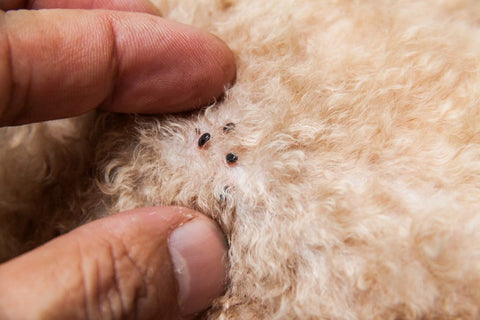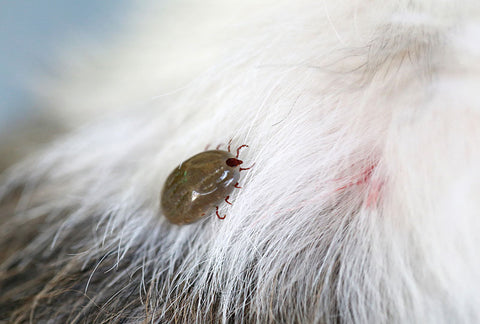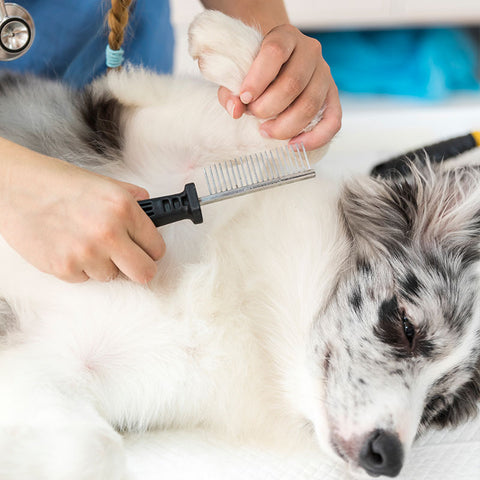Fleas and ticks on your pets can be quite a pain in the neck, both figuratively and literally! Though a thorough good grooming can help get rid of them, how do you get them out of your house and prevent another infestation? Read on to find out, and perhaps you can also learn how to remove these pesky little creatures!
*Warning: Images of fleas and ticks ahead that some may find uncomfortable*
What are fleas and ticks?
Fleas are parasites that feed off blood, usually those of your dogs or cats. This usually results in intense itching, scabs, red spots, and hair loss on your pets. Fleas may also transmit germs, causing sickness and diseases and might even trigger allergic reactions.

Photo from westernexterminator.com.
Ticks are also parasites, though with eight legs, they’re an arachnid just like a spider. Those allergic to tick bites may experience swelling and burning sensations at the wound, along with rashes and blisters if serious. Diseases can also be spread through a bite, causing symptoms such as rashes, headaches, nausea, and fever.
Ticks feed off blood as well, and grow larger the more blood they drink, reaching the size of a marble at their biggest. This results in drastically different body sizes before and after a tick finishes their drink:
A tick before they’ve drank blood:

Photo from americanpest.net.
A tick after they’ve drank blood:

Photo by meepoohyaphoto on Freepik.com.
A tick before (left) and after (right) they’ve drank blood

Photo from commons.wikimedia.org.
How do I spot fleas and ticks on my pet?
To check if your pet has fleas, keep an eye out for these signs:
- Constant scratching
- Areas of hair loss or bald patches
- Spots or scans
- Redness and irritation
- Thickened skin in areas, such as ears
- Movement in fur coat
- Tiny dark flecks or small insects in fur
You can also check your own body for signs of a fleas infestation. If you have unaccounted insect bites, that may also be a sign of fleas running about your house.
To confirm the presence of fleas, comb through your pet’s fur over a flat surface and see if there are any fleas or flea droppings deposited. Add a few drops of water on the droppings and if it turns reddish brown, it’s highly likely your pet has fleas on their body.

Photo by freepik on Freepik.com.
For ticks, they’re usually big enough to spot after they’ve fed and can be felt when running your hand through your pet’s fur. Be sure to check through your pets’ fur after walks to make sure none has followed you home; ticks tend to stick to their head, neck, ears, and feet.
How do I prevent and get rid of fleas?
Prevention is the best cure, so make sure your pets have sufficient flea preventatives to prevent a flea infestation, such as flea collars and pills. If there are already fleas on your beloved fur companion, you can get fast-acting preventatives that can kill the pests quickly and effectively, such as flea shampoo.
Ticks can be easily removed with tweezers as well, and the bite wound should be washed thoroughly afterwards. Be sure to not squeeze the tick’s body or have its head stuck in your pet’s body, as it increases the risk of infection.

Photo by meepoohyaphoto on Freepik.com.
If the parasites are still staying on your pet’s body, or if your pet has an allergic reaction to their bites, bring them to a veterinarian for further treatment. They will be able to prescribe stronger treatment and ensure that your pet stays safe and healthy!
Make sure that your house is also safe from infestation! Here are some things you can do to prevent them from happening in the future:
- Brush your clothes off before entering the house to ensure that you don’t bring any fleas or ticks indoors
- Wash your pets’ beds and toys in hot, soapy water to ensure all fleas and ticks are killed
- Wash your own beddings, pillows, blankets etc. or wherever your pet sits at with hot water
- Vacuum all crooks and nannies of your house regularly, and throwing out the vacuum bag immediately to prevent the hatching of parasites
- Groom your pets regularly to prevent any parasites or their eggs from staying on their fur

Photo by prostooleh on Freepik.com
Though fleas and ticks can be rather nasty creatures, as long as you continuously clean your pet and home, they will be nothing but a problem of the past!










